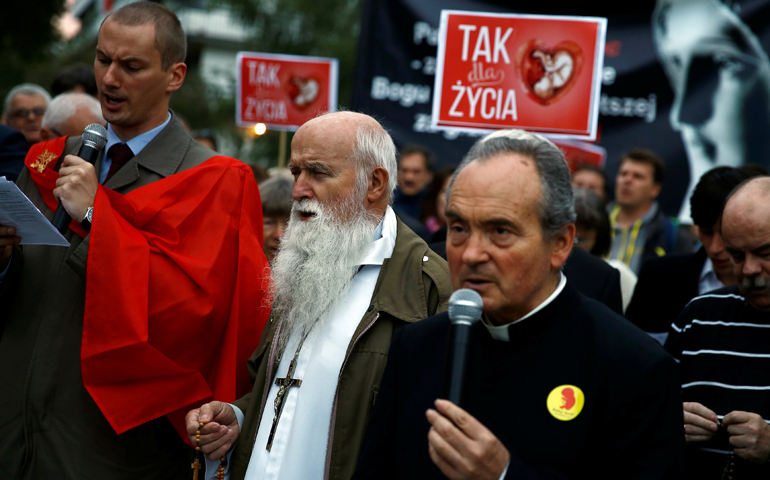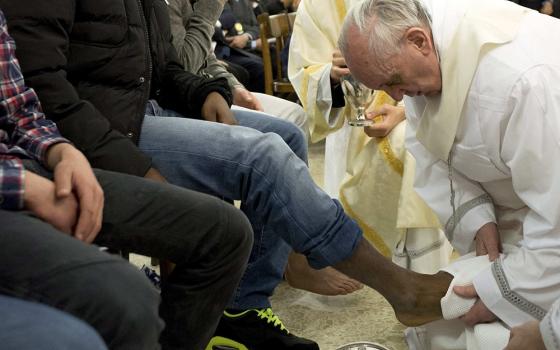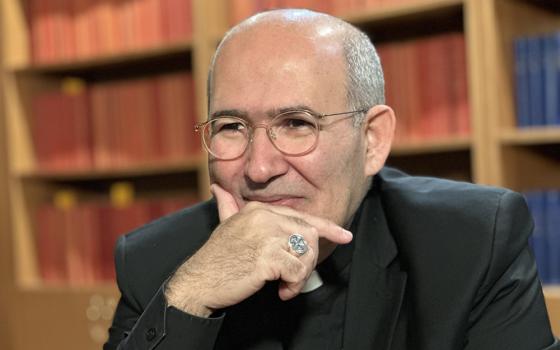
A clergyman and others pray as they take part in Sept. 22 pro-life rally in front of the parliament in Warsaw, Poland. Banners read: "Yes for life." (CNS/Kacper Pempel, Reuters)
A new law designed to clamp down further on one of the most restrictive abortion laws in Europe takes effect in Poland Jan. 1.
Current Polish law permits abortion only if the life of the mother is at risk, in cases of rape, or when the fetus has serious issues. The new law provides an incentive for women to have the baby even when serious issues are detected during pregnancy.
Women who agree to deliver babies with serious issues will receive a one-time payment of 900 euros ($1,000), which will be paid only if the baby is born alive. The law also provides funding for a program coordinator and for psychological assistance to the mother.
Jaroslaw Kaczyński, head of Poland's ruling Law and Justice Party, has voiced support for women who choose not to abort unborn babies with serious issues "so that the pregnancy would end in birth and the baby would be baptized and have a name."
Kaczyński estimates there are 1,000 legal abortions of unborn babies with serious issues performed each year in Poland, which he claims are mainly cases of Down syndrome. He says the new "for life law" will reduce that number.
Critics of the law, like Elzbieta Korolczuk, who teaches gender studies at Warsaw University, dispute the claim that most of these legal abortions involve Down syndrome. Korolczuk says there are no statistics that prove this. Like other critics, she views the new law as a cynical government attempt to weaken the existing exemptions in the current law.
Related: "Poland debates proposal to ban all abortion" (July 13, 2016)
"The real reason they passed this law is to introduce further restrictions on abortion in the future," said Korolczuk, adding that 900 euros may be attractive to impoverished people in regions where many doctors won't perform abortions for reasons of conscience.
It is premature to predict how many women will register for this financial benefit, which critics say is, in any case, inadequate to meet the costs involved in bringing infants with serious issues into the world.
"This is in no way adequate for the parents of children with disabilities," said Zusanna Warso, a specialist on women's issues at the Helsinki Foundation for Human Rights. "This has been confirmed to me by parents of disabled children on a daily basis."
Gosia Nowicka, a translator in Warsaw, said the new law has been dubbed "trumienkowe," or "small coffin money." She called the law denigrating to women. "It's based on the premise that women willing to accept this money can be bought for peanuts," Nowicka said.
"Putting a price tag on the unimaginable suffering of women and children is really designed to limit access to abortion," said Krystyna Kapcura, director of the Federation of Women and Family Planning in Poland, noting that the $1,000 benefit was "a paltry sum that would barely cover a month's care for a disabled child."
According to Kapcura, Polish women have an estimated 150,000 abortions annually, either illegally in Poland or legally in neighboring countries like Germany and Slovakia.
Related: Polish women to protest proposed abortion restriction (Oct. 21, 2016)
There is little sex education, or access to family planning centers, and the morning after pill is often not available in many parts of the country, said Kapcura.
The Polish Federation of Pro-Life Movements spearheaded the campaign for the new law. "Pro-life communities have welcomed the law to support pregnant women and families as an expression of solidarity with the families rearing children with special needs," said Pawel Wosicki, president of the Federation.
The campaign began with the Oct. 6 defeat of proposed legislation that would have banned all abortion, with no exceptions, and would have made abortion a criminal act, punishable with a prison sentence. The new law is seen as a way to placate the Roman Catholic church after the defeat of a total ban.
Prior to the fall of communism in 1989, there were no restrictions on abortion. In 1993, however, Poland enacted restrictive legislation under pressure from the church.
[Donald Snyder is a freelance writer who worked at NBC for 27 years as a news producer. He retired from the network in 2003.]





